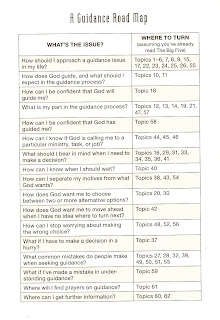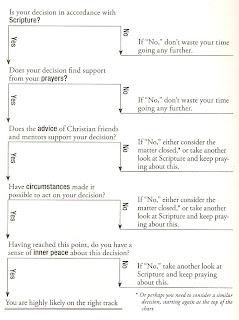It’a April 15th, but this has nothing to do with taxes! It is time for the Non~FIRST blog tour!(Join our alliance! Check out Non~Fiction in Rather Short Takes. Every 15th, we will featuring an author and his/her latest non~fiction book’s FIRST chapter!
The feature author is:
Gordon S. Jackson
and his book:
A Handbook for Discovering God’s Will
NavPress Publishing Group (March 26, 2008)
ABOUT THE AUTHOR:
 GORDON JACKSON is a professor of communication studies at Whitworth University in Spokane, Washington. He has worked at Whitworth as a journalism professor and college administrator since 1983. Originally from South Africa, where he worked as a journalist, he is a frequent speaker for churches and other groups. Dr. Jackson has spoken to scores of church, Sunday school, educational, and civic groups on a wide range of topics. In the past few years, he has also served as a consultant for church groups and Christian educational institutions in Uganda, Lebanon and Egypt.He is also the author of:
GORDON JACKSON is a professor of communication studies at Whitworth University in Spokane, Washington. He has worked at Whitworth as a journalism professor and college administrator since 1983. Originally from South Africa, where he worked as a journalist, he is a frequent speaker for churches and other groups. Dr. Jackson has spoken to scores of church, Sunday school, educational, and civic groups on a wide range of topics. In the past few years, he has also served as a consultant for church groups and Christian educational institutions in Uganda, Lebanon and Egypt.He is also the author of:
Destination Unknown
Never Scratch a Tiger with a Short Stick and Other Quotes for Leaders
AND NOW…THE FIRST CHAPTER:
 Introduction Choosing Well: Living Out God’s Will
Introduction Choosing Well: Living Out God’s Will
Most of the time in our attempt to follow Christ, we already know perfectly well what God’s will is and what He expects of us. It is to continue the work He’s already given us, precisely where we are, according to the guidelines for godly living we know from Scripture.
But there come moments when we face major decisions, crossroads in our journey where the signposts aren’t as legible or well-lit as we would like. We face hard choices. Should I attend this college or that one? Should I switch jobs? Am I truly being called to full-time ministry, or am I just bored with my current vocation? Is this the person God would have me marry? Should I move to a new city or stay put?
Some decisions we’ve anticipated for a long while, for example what to do upon graduating from college. Others are thrust upon us suddenly, perhaps an opportunity that comes out of the blue. Yet others can brew or stew slowly over time, such as a growing sense of disillusionment and frustration with our current job.
Situations like these ultimately demand some kind of decision. Assuming we seek to honor God in all areas of our lives—education, family life, career, ministry—we want to make a godly choice. But how? Clearly, guidance is a difficult area for Christians.
Scores of books on the topic have appeared over the past several decades demonstrating the ongoing quest for counsel on this issue. This book is intended to assist you in thinking through questions about guidance more incisively and, if you heed the shared wisdom handed down from two thousand years of our faith, to help you make wiser, more thoughtful, and more godly choices. The generalizations presented here are distilled from the wisdom of numerous thoughtful writers on this topic. In essence, the thoughts in this book are not new. The hope, however, is that their presentation and format will make these ideas more accessible and easier to understand and apply in your life. (A note on citations: For the most part, I’ve tried to avoid cluttering your reading by limiting the endnotes to some lesser-known authors for whom you may want to know the source.)
It’s plain that those who follow Christ could use ongoing help in this area. “In our quest for God’s guidance,” said J. I. Packer, British theologian and scholar, “we become our own worst enemies, and our mistakes attest to our nuttiness in this area.” This book is an attempt to head off some of those self-defeating tendencies and minimize the nuttiness. In doing so, this book differs from other writings on guidance in two ways. The first is its emphasis. This volume assumes what other authors carefully and painstakingly identify: the ample scriptural evidence that God guides those who genuinely seek His will and that He desires only the best for His children. So the assumption here is that you don’t need to be persuaded that God is both able and eager to guide us.
The second difference lies in this book’s approach. Most other books on this subject offer systematic, chapter-length expositions on the nature of guidance and its relationship to vital living as a Christian. By contrast, the approach here is far more hands-on, identifying practical problem areas, possible stumbling blocks, areas of confusion, and any other aspects of guidance that can lead to confusion and mistakes. What follows is a series of thoughts on topics about guidance. Each topic, summarized as a principle or key concept, serves as a stepping-stone through what often can be a mental and spiritual swamp for Christians seeking God’s will and direction.
All the topics are built around a foundational section called The Big Five—and Beyond. This is the assumption repeated by many writers that guidance is normally the product of five elements:
1. Scriptural guidelines
2. Prayer
3. The advice of other Christians
4. The circumstances we face
5. A sense of inner peace about our decision
It is typically the combination of these five ingredients that helps lead us toward sound, godly decisions.
Something else that holds together the sixty-two principles in this book is the understanding that guidance is a process that involves carefully thinking through and incorporating The Big Five, as well as other issues pertinent to your situation. Following this introduction is A Guidance Road Map—a set of common questions about guidance, along with the topics that are likely to help you most with each question. Please read The Big Five—and Beyond before dipping into other topics. Without the context it provides, the other sections will be less helpful.
 The sixty-two topics, and the principles on which they are based, are presented as generalizations. As such, they need to be seen as part of the broader whole. What’s more, these principles don’t have to be read in order. After reading The Big Five, feel free to browse through the book and pick and choose among the issues that most interest you. Or you can scan the alphabetical list of topics at the back of the book and find subjects of particular concern to you.As you read the pages ahead, please be aware of the following assumptions that are woven through the array of principles:
The sixty-two topics, and the principles on which they are based, are presented as generalizations. As such, they need to be seen as part of the broader whole. What’s more, these principles don’t have to be read in order. After reading The Big Five, feel free to browse through the book and pick and choose among the issues that most interest you. Or you can scan the alphabetical list of topics at the back of the book and find subjects of particular concern to you.As you read the pages ahead, please be aware of the following assumptions that are woven through the array of principles:
? You take seriously your commitment to follow Christ and seek to live a God-pleasing life. In other words, you earnestly seek God’s will for your life, not His seal of approval for what you plan to do anyway.
? You take seriously the authority of Scripture and are willing to apply its guidelines to all areas of your life.
? You already are convinced that God is able and willing to guide you in all aspects of your walk with Him, and you accept that He will do so on His terms and with His timing.
? You take seriously your God-given ability to think through whatever guidance issues you face.
It’s important to note a truly astonishing fact: We claim as part of our faith not only that the Lord of the universe sent His Son to die for us and redeem us from our sins but also that His interest and love for us continue day by day. Like the most loving of parents, God Himself seeks to guide and direct every facet of our lives.
Two reality checks also need mentioning. The first is that living our lives in a God-directed manner is never easy. Living as we do with a sinful nature, it is extremely difficult to do what we know we should and to avoid what we know we shouldn’t do. Paul said, “I do not understand what I do. For what I want to do I do not do, but what I hate I do” (Romans 7:15). If living the day-by-day dimension of following Christ is difficult, it’s no easier when we face those extraordinary moments when tough choices must be made. Søren Kierkegaard, nineteenth-century Danish philosopher and theologian, said, “It is perfectly true, as philosophers say, that life must be understood backwards. But . . . it must be lived forwards.”
As we grapple with trying to understand God’s guidance in our lives, we often recognize His leading only as we look back. But we must make difficult choices while living life in forward mode. No book on guidance can completely answer anyone’s questions; we each need to answer those ourselves. The ideas outlined in this book are only tools, and they are worthless apart from your commitment to seeking God’s will and your willingness to struggle through issues.
The second reality worth noting concerns our limitations in understanding how God moves in our lives. It is the height of presumption to think that any book can prescribe how God may choose to reveal Himself to us. The only absolute we can be sure of in this regard is that God will not guide us in a way that is contrary to His nature.
A final thought on how God directs our lives: While those who follow Christ agree that God is keenly interested in our lives, they differ on the degree to which He has a “perfect plan” mapped out for each of us. Some contend that God has a carefully worked-out blueprint for our lives: His guidance helps us discover that perfect will, and His Holy Spirit helps us live it out. Other Christians see this approach as artificially narrow. God, they believe, is not boxed into some lockstep, foreordained approach to how our lives unfold. God’s grace, power, and imagination surely transcend whatever mistakes we make or sins we commit, which would presumably otherwise relegate us to a “second best” plan. Rather, God is always able to offer constant, uninhibited love and direction, regardless of how far we might have fallen from His standards in the past.
If the issue of a “perfect plan” is important to you, understand that the bias of this book is clearly toward the latter position. God’s boundless grace in dealing with us makes Him love us no less when we choose something other than His best at any given moment. Yes, God’s discipline may follow our poor choices. But for the Christian who is wholeheartedly seeking God’s will, He presents us with far more of a buffet table of legitimate options than some stiflingly healthy yet tasteless diet. A. W. Tozer, a well-known teacher and writer, said, “The man or woman who is wholly or joyously surrendered to Christ can’t make a wrong choice—any choice will be the right one.”
That remark captures the spirit with which this book is written: that ours is a God of freedom whose guidance we can seek with confidence and enthusiasm. He’s a God of infinite love who enthusiastically champions our case and seeks our best. He is the architect wanting to help us build holy lives, lived to the full (see John 10:10). Yet we sometimes regard Him as the county planning officer who’s looking for every weakness in our plans, smugly catching yet another way we’ve fallen short of the building code. God is not a stickler; rather, He’s the architect who brings our possibilities to reality for our benefit and for His pleasure.
This book is an attempt to assist you as you invite God, the ultimate architect, to help you build your life in keeping with His overall design to make us holy persons. From the foundations to the finishing touches, He is eager to help at each step. The pages that follow are intended to help you build your own house of faith that shall last through eternity.
1
The Big Five—and Beyond
Every quest for guidance should be shaped by scriptural guidelines, prayer, the advice of other Christians, the circumstances we face, and an overall sense that this course is what God wants.
It’s the big picture that counts. A recurring theme found in books on guidance is that you need to look at the big picture as a whole when making major decisions concerning God’s will. Far from basing our decision entirely on a chance remark made in last Sunday’s sermon or on an obscure verse in 2 Kings, God expects us to use all the vehicles He’s made available for our decision making. That’s why it’s important to consider each of The Big Five factors and see how they mesh together as we consider our decision. Again, these five factors are:
1. Scriptural guidelines
2. Prayer
3. The advice of other Christians
4. The circumstances we face
5. A sense of inner peace about our decision
 Until you’ve got a thumbs-up on each of the five, you’re probably not ready to make a decision. If, for example, you’re seriously considering a career change, but your spouse or closest friends are advising you against it, you need to check your thinking. Or if you’ve been invited to go on a short-term mission trip and the first four points check out just fine, yet you’ve still got a nagging feeling that something isn’t right, once again it may be best to hold off on your decision and give it further thought.If you were leaving later today for a trip abroad, you’d make sure you’d taken care of your passport, airline ticket, health insurance, luggage, and spending money. If you were heading for the airport and realized you’d left your passport at home, it’s unlikely you would keep going and say, “Well, four out of five isn’t bad.”
Until you’ve got a thumbs-up on each of the five, you’re probably not ready to make a decision. If, for example, you’re seriously considering a career change, but your spouse or closest friends are advising you against it, you need to check your thinking. Or if you’ve been invited to go on a short-term mission trip and the first four points check out just fine, yet you’ve still got a nagging feeling that something isn’t right, once again it may be best to hold off on your decision and give it further thought.If you were leaving later today for a trip abroad, you’d make sure you’d taken care of your passport, airline ticket, health insurance, luggage, and spending money. If you were heading for the airport and realized you’d left your passport at home, it’s unlikely you would keep going and say, “Well, four out of five isn’t bad.”
Similarly, you’re probably asking for trouble by heading into a decision without a check mark against each of The Big Five. Is it possible that the advice from your spouse or friends is wrong, or that you’re confusing a lack of inner peace about a decision with plain old nervousness? Of course. The point here isn’t that missing one of these five checkpoints means you shouldn’t go ahead; it simply means there’s a warning light on the dashboard and you’re well advised to take a second look at what’s happening. Or, to switch metaphors, if these five principles don’t line up neatly like lights on a runway, you need to question seriously whether you’re ready to come in for a landing.
Sometimes those landing lights don’t line up neatly, or one warning light keeps flickering on the dash—and yet a major decision still looms. Remember, guidance is seldom a simple, clear-cut process. The words of C. S. Lewis provide a helpful reminder of the many ways God can speak to us: “I don’t doubt that the Holy Spirit guides your decisions from within when you make them with the intention of pleasing God. The error would be to think that he speaks only within, whereas in reality he speaks also through Scripture, the church, Christian friends, books, etc.”
Because working toward the decisions God would have us make can be complex and can lead to ambiguous answers, it’s necessary to dig deeper into our understanding of The Big Five. The separate entries of The Big Five are not of equal importance. The simple flowchart that follows shows that scriptural principles are the starting point. But they’re only the starting point. Each of these five principles merits careful attention. The next step is to examine any of the five elements that merits special attention in your situation. (These topics are addressed in the pages that follow.) Alternatively, you may want to turn directly to other individual topics that speak to your needs. The Guidance Road Map on page 17 will help you do that.
Please check out Non~Fiction in Rather Short Takes. You may see a book that you would like to help promote.


